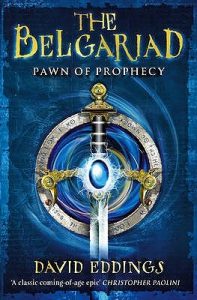Pawn of Prophecy by David Eddings
 I have to start by admitting that I struggle a little when reading ‘classic’ fantasy. The reason for this is probably my age: I’ve (more or less) become familiar with the genre by reading ‘modern’ fantasy, which is influenced heavily by the likes of Tolkien, and Gemmell, and Eddings, and the like. This means that when I read a book like Pawn of Prophecy, I can’t help but read certain parts of the story (such as a huge man who transforms into a bear, a farmboy torn away from his home and forced into an adventure, a mysterious magical object, and a wise old man who is more than he first appears) and think ‘oh, dear, how derivative’. When, in fact, these guys wrote about this stuff before everyone else did. They created these tropes in the first place; they made them fashionable, and it’s only now that they’ve become, to varying extents, cliched.
I have to start by admitting that I struggle a little when reading ‘classic’ fantasy. The reason for this is probably my age: I’ve (more or less) become familiar with the genre by reading ‘modern’ fantasy, which is influenced heavily by the likes of Tolkien, and Gemmell, and Eddings, and the like. This means that when I read a book like Pawn of Prophecy, I can’t help but read certain parts of the story (such as a huge man who transforms into a bear, a farmboy torn away from his home and forced into an adventure, a mysterious magical object, and a wise old man who is more than he first appears) and think ‘oh, dear, how derivative’. When, in fact, these guys wrote about this stuff before everyone else did. They created these tropes in the first place; they made them fashionable, and it’s only now that they’ve become, to varying extents, cliched.
There is a fair bit of this book that was clearly influenced by Tolkien, but there’s much more of it that seemed familiar because I’ve read it in more recent books. The epic journey, the motley companions, the young boy who discovers that he’s actually rather special, the evil God bent on ruling the world . . . It’s all traditional, classic stuff. And there’s nothing wrong with that. (That is, in fact, the reason I’ve been enjoying Daniel Abraham’s Dagger and Coin series so much recently – he draws on such traditional plot points in a nostalgic sort of way, but mixes them up just enough to keep in interesting and entertaining.)
However, what is less impressive is that there isn’t much of a real plot going on here. I realise it’s the first book in a series, and the entire book has obviously been spent setting up for the rest of this series, but that doesn’t make the constant repetition (travel to a town, stay at an inn, have some cryptic conversations; travel to a town, stay at an inn, have some cryptic conversations . . . rinse, repeat, etc.) any less of a chore to read. I think the fact that I’ve had to read it in small chunks hasn’t helped much: there hasn’t been a lot to really grip me, and I felt like I was reading the same bit again and again every time I picked up the book.
However, I did rather like the characters. The main character – the boy Garion – is fairly likeable, and the author has done well with writing credibly from the point of view of a child with a nice mixture of ignorance, curiosity, and simplicity. With the current trend of multiple PoVs, it’s certainly refreshing to read a tale that focuses entirely on one main character. The other character I really liked was Silk, who has more of a minor role: in fact, the author does a nice job with the entire ‘supporting’ cast, giving them enough personality to make us care about them and prevent them from fading into the background.
It’s also good to see how well Eddings has built his world: we have maps (which, while often criticised as yet another cliche of the genre, I actually feel give an extra dimension to the story), we have conflict (racial, political and gendered), we have politics, we have history, and we have economics. And, even better, it’s not thrown in our faces: it’s just there, giving the story a sense of reality, which is exactly how it should be.
There’s certainly a sense of where the overall story began, and where it’s going to end. This, along with the sympathetic characters and the easy and simple (if occasionally flat) writing style, is the only real reason I might give the second book in the series a try at some point.

[…] The Belgariad by David Eddings […]